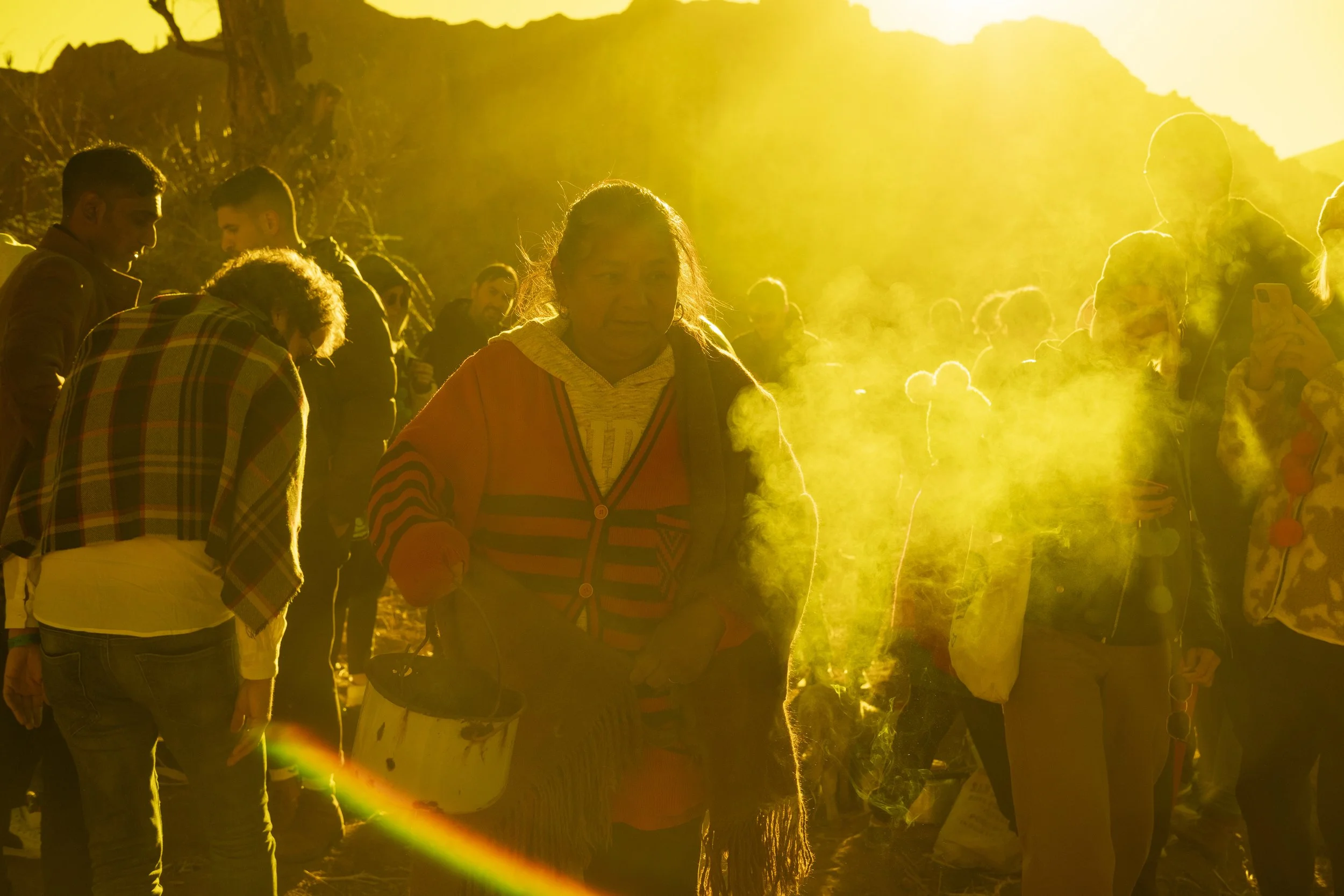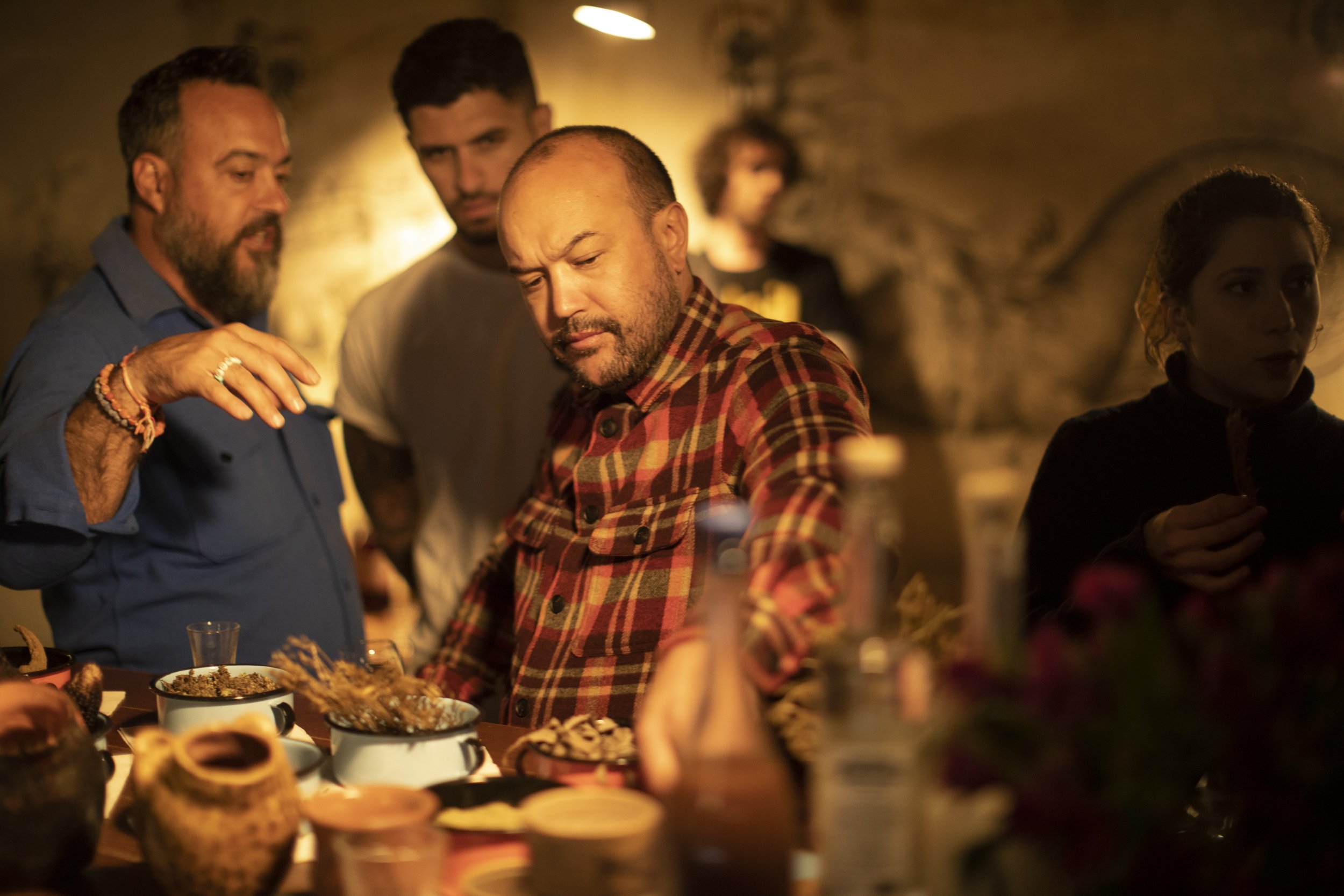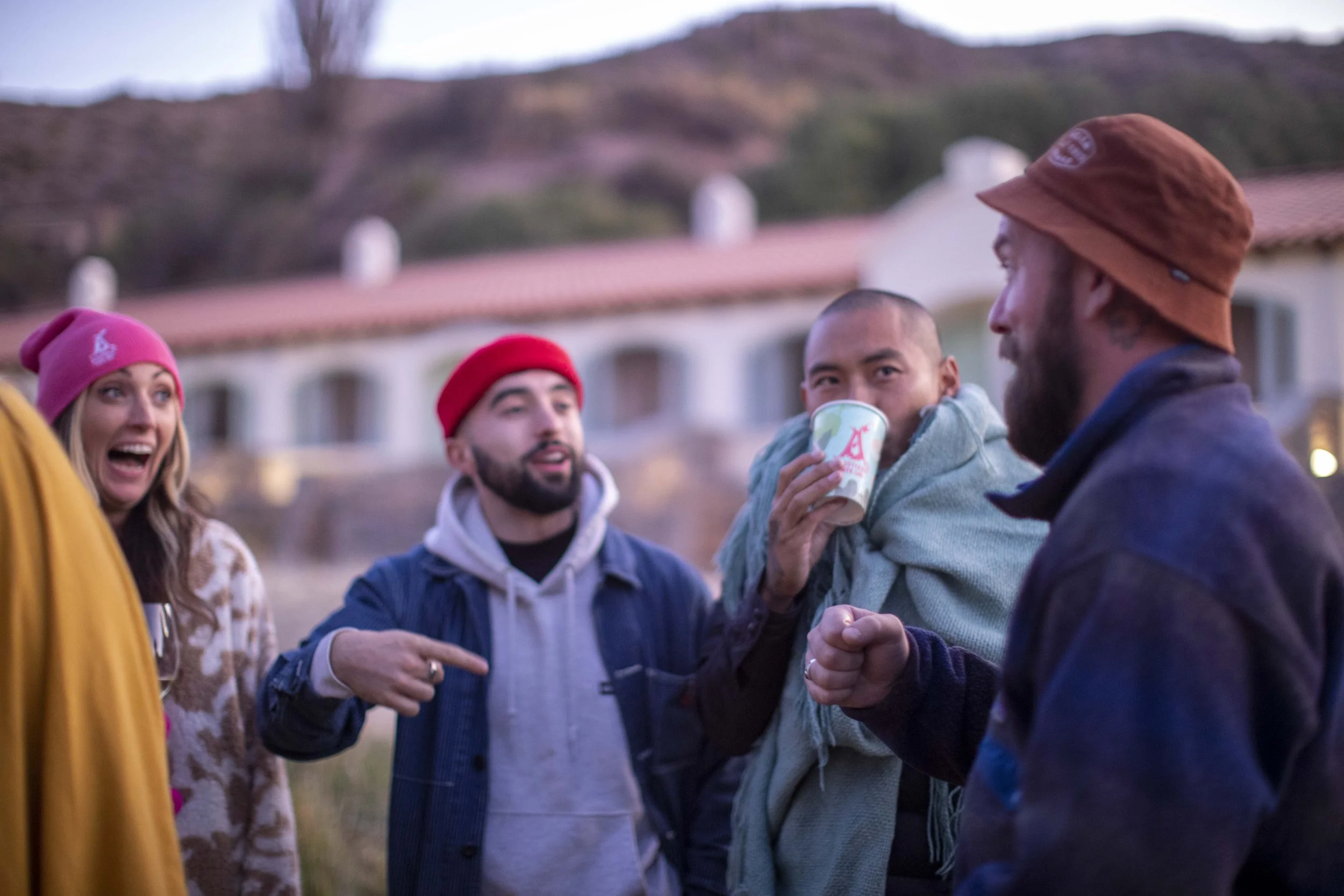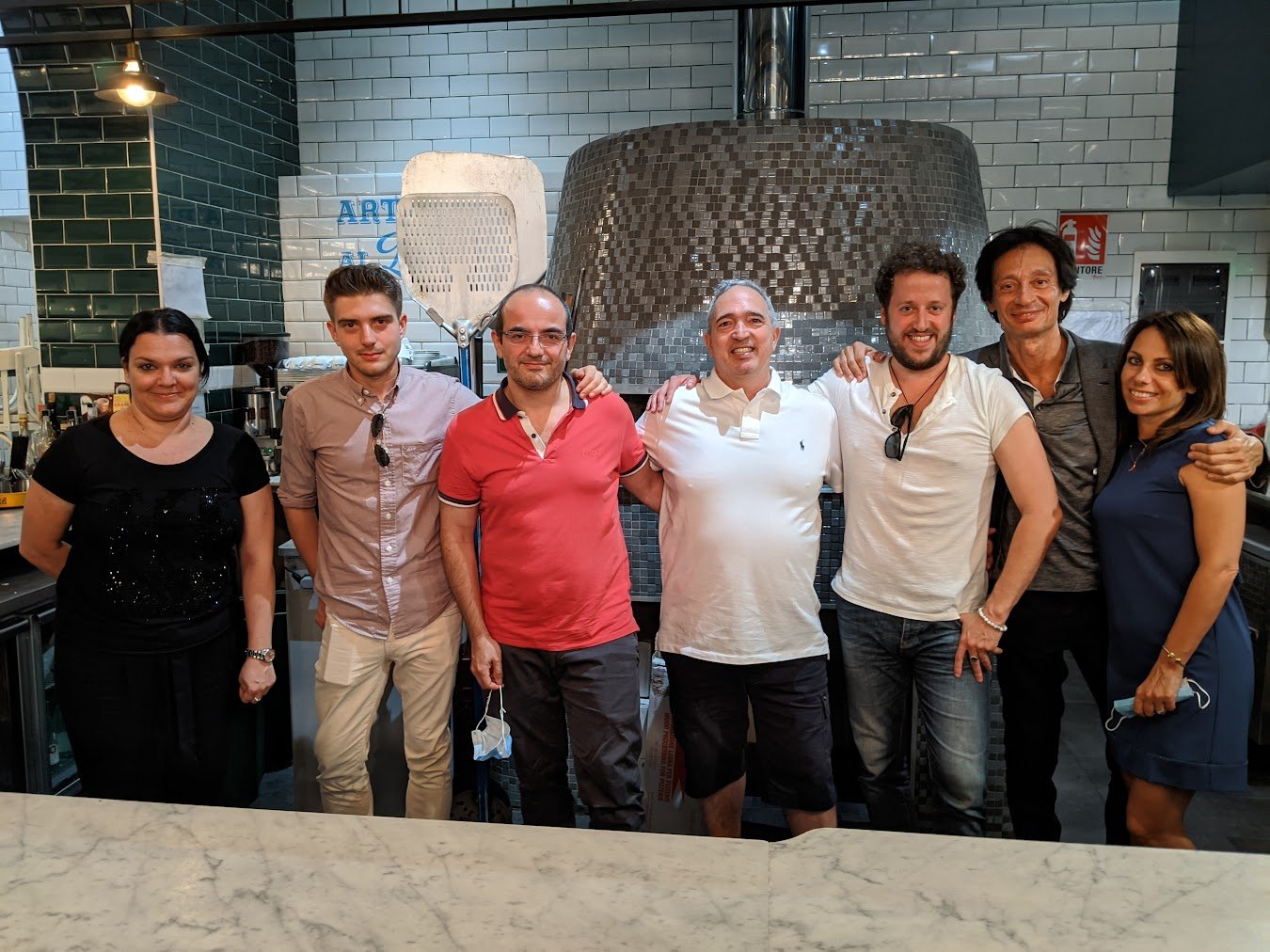“For me Festival Atlantico is a time to gather together with the greatest minds and people that I admire from all around the world. It is chance to show them my country, my lands and the people that built Argentina.” - Tato Giovannoni
With a focus on sustainability in this year’s edition of Festival Atlantico, Tato Giovannoni brought together global leaders in bartending and gastronomy in Argentina this August, to share knowledge about innovative solutions to reduce the carbon footprint in the industry. The yearly conference offers experiences and talks in stunning natural settings in Tato’s native Argentina, with the objective of generating concrete changes in favor of greater environmental awareness. At the same time, Festival Atlantico involves local producers and valorizes the products, recipes and their ancient uses specific to each region.
In organizing Festival Atlantico, Tato Giovannoni as creative director was joined by co-owner of Floreria Atlantico Aline Vargas as supervisor, executive producer Picky Courtois, production coordinator Alessia Maccioni and market and gastronomy producer Juan Iganacio Gerardi.
Following up on the first edition in Valle de Uco in 2019 and a pandemic shortened version in Buenos Aires in 2020, Festival Atlantico returned 1 and 2 August 2022 in the province Jujuy, located in the extreme northwest of Argentina which borders with Chile and Bolivia.
Nearly 200 participants attended the conference, including bartenders, chefs, artisans, farmers and journalists. Taking place on a plateau 2641 meters above sea level at Huacalera hotel in the Quebrada de Humahuaca, the magical surroundings provided the ideal setting for sharing stimulating stories about the industry’s intimate yet precarious connection with nature. In the numerous seminars and roundtables over two days, a wide range of experiences were shared, from novel methods to reduce waste, to changing of diets to have less impact on the environment, but also respecting the human side of sustainability, and honoring ancient family traditions and recipes.
Paying respect to Mother Earth
This year’s Festival Atlantico coincided with the celebration of Pachamama day, in which the local community thanks Mother Earth and prepares the fields for planting. In Inca mythology, Pachamama is a fertility goddess that represents Mother Earth who presides over planting and harvesting. The Pachamama ritual begins on the first day of August and is celebrated throughout the month because it is the coldest period of the winter season, when the Earth is at its weakest and needs to be nourished. Andeans believe that is vital to be on good terms with Pachamama in order to protect themselves, their crops and livestock.
Andeans perform rituals where they bury fruits, tobacco, coca leaves, seeds, drinks such as chicha in the Earth as a tribute to Pachamama. Tato involved all of the international guests in the Pachamama ceremony that was guided by locals Dominga Choque and Flor Barbarich. It was a memorable and moving experience, with a profound sense of connection with nature felt by everyone involved in the ritual giving respect to Mother Earth.
Among the international guests involved in the Pachamama ritual and Festival Atlantico conference were Italians Patrick Pistolesi of Drink Kong Rome, Giacomo Giannotti of Paradiso Barcelona, Fabio La Pietra of Sub Astor San Paolo and Gabriele Manfredi, Australian Naren Young of Sweet Liberty Miami, Iraq-born Moe Aljaff and co-founder of Two Schmucks Barcelona, Greek Nikos Bakoulis of The Clumsies Athens, Irishman Barney O’Kane of Little Red Door Paris, Singaporean Vijay Mudaliar of Native and Analogue, Chilean Miguel Gonzalez Larraguibel, Canadians Megs Miller and Kelsey Ramage, Mexicans Gina Barbachano of Hanky Panky and José Luis León and Alberto González Rivas of Limantour, Peruvians Aaron Díaz of Carnaval and Luis Flores, Brazilian Marcio Silva, Norwegian Odd Strandbakken and Argentines Diego Cabrera of Salmon Guru Madrid, and Matías Iriarte of Ginbo and Chapeau 1987 in Palma de Mallorca.
Other than bartenders, other esteemed participants of Festival Atlantico included Mexican entrepreneur Walter Meyenberg of Hanky Panky Mexico City, French hospitality entrepreneur Jean Trinh of Alquimico Cartagena, Oxford-educated fermentation guru Johnny Drain, Mexican plant biologist turned master distiller Ivan Saldana, former Empirical Spirits head of research Chris Stewart, Greek winemaker Thanos Georgilas, British-born author of Cocktails of Asia and managing editor of DRiNK Magazine Holly Graham, Belgian-born and Spanish-based cocktail writer Francois Monti, Indian drinks writer and consultant Priyanka Blah, Brazilian freelance food and drinks reporter Marcella Sobral, British freelance journalist and sommelier Sorrel Moseley-Williams, Uruguayan sommelier and journalist Marcela Baruch, South Africa’s leading cocktail and spirits writer Leah van Deventer and Venezuelan Margarita Sáder, founder of MSbartrends and Paradiso Barcelona.
Following the emotional Pachamama ceremony, the participants returned to Huacalera hotel, where Festival Atlantico was officially opened together with Mercado Atlántico, where artisans sold local food, clothing and artwork. Next to follow was two full days of talks, which had a much different feel than a typical master class. Best stated by Jean Trinh of Alquimico "In bar shows people usually prefer to drink at booths rather than sit down to learn. But here in Jujuy, the experience was completely different. We were all listening carefully to each story that was told.”
Novel ways to better the planet from Singapore and Paris
Singaporean bartender and bar owner Vijay Mudaliar described how he uses foraging to highlight regional ingredients at Native, a bar he opened in 2016. At Native, the team is also conscious about reducing waste but now with the newly launched Analogue, waste is avoided from the very beginning. Vijay has been brainstorming the idea for Analogue for years, as he has long been frustrated with overfarming and the planet’s dependence on foods that have a negative impact on carbon footprint such as beef, milk and eggs. Vijay’s solution? An entirely plant-based menu of cocktails and food.
According to the United Nations Environment Programme, a shift to predominantly plant-based diets is crucial to reduce biodiversity loss and human impact on the environment. Moving towards plant-based diets would free up the land used for livestock to allow for the restoration of ecosystems and the flourishing of biodiversity. A further study in 2022 published in Nature Food found that if high-income nations switched to a plant-based diet, 100 billion tons of CO2 emission could be reduced by the end of the century.
The initial challenge with Analogue is to convince people that plant-based food can be fun and tasty, not just healthy and good for the environment. Although there is room for improvement, months into Analogue’s existence, Mudaliar is proud to report that 50% of his guests are not vegetarians. There is much excitement in plant-based cooking in part because it’s so new. Vijay stated that “We all know how to cook beef, pork and eggs, but with plants there has been less research on how to get the most flavor out of them.” There are over 20,000 species of edible plants in the world yet fewer than 20 species now provide 90% of our food. Mudaliar expects significant research into plant-based food production will lead to a much greater use of a wider range of plants in cooking.
With climate change, ever increasing temperatures will change the way we eat and drink. At Analogue, they are studying cacti and how they can be incorporated into gastronomy and mixology. Mudaliar is even thinking about the day when we may inhabit other planets and what food could be suitable for life in outer space. For example, the clarified negroni at Analogue features two astronaut favorites: peanut butter and spaceman ice cream.
As part of his efforts to bring positive changes to the Earth, Mudaliar emphasizes that it also important to be as inclusive as possible in hospitality. Mudaliar claims that all too often in to hospitality we focus on serving on the elite instead of the widest range of customers possible. In addition to sustainability, we should always keep accessibility in mind. At Analogue, their signature 3D printed bar top made from 1600 kg of recycled plastic bottles is lowered in one corner so that someone in a wheelchair can also enjoy a drink up at the bar. Analogue also offers a wide range of cocktails with no alcohol to avoid alienating non-drinkers. So that even diabetics can enjoy the drinks at Analogue, they opt for low glycemic index and natural sweeteners such as coconut sugar or xylitol, a natural plant-based sugar alcohol. To achieve complex drinks with robust flavors without alcohol, Analogue sought inspiration from the perfume industry, using edible oils combined with hydrosols and a natural sweetener. El Mariachi is a best seller on the menu and features smoked morita hydrosol, lime oils, clarified strawberry, Thai basil, vitamin C and CO2.
Switching continents from Asia to Europe, Paris’ Little Red Door has made a dramatic shift towards sustainable practices in part thanks to difficulties encountered during the pandemic. As explained by Little Red Door’s head bartender Barney O’Kane, in the trying times of lockdowns and reopenings in 2020-2021, the team recognized that although many were suffering, their local suppliers were hit the hardest. In particular, their fresh produce provider were hurt the most, with crops starting to come into season but only with a fraction of their traditional markets open.
With sense of helping the community, Little Red Door’s “Grounded” menu was aimed at supporting the producers in their ecosystem who were struggling. But as the team did more research into how to work with farms in their drink menu, they realized that they could actually pivot their bar operations to benefit not only local producers, but provide compelling drinks that benefited the bar’s bottom line, It was with the change to Grounded, that the team drastically decided to change the way they operate day to day.
Through their new Flourish menu, which recently won World’s Best Cocktail Menu at The Spirited Awards at Tales of the Cocktail and the Ketel One Sustainable Bar award at World’s 50 Best Bars 2022, Little Red Door continues to compassionately put the producer, produce and product journey at the center of their guest experience, converting directly sourced produce into liquid products that form the core of each cocktail.
With the new Farm to Glass model, they know every detail of the produce they work with: where it is from, when it was picked, and everything about the people who made it. Collaborating with a network of French producers, Little Red Door’s Farm to Glass model for menu creation features 10 signature cocktails centred on one item of French produce such as Nyons Olives, Alsacien Hops, and Grenoble Walnuts. O’Kane explains that composition of the alcoholic component of their drinks is approximately 70% handmade liquor using farm-sourced produce and 30% from small spirits/liqueurs producers. At Little Red Door, they do not use produce to make garnishes but actual alcoholic products. This means they buy larger quantities of produce, which is a benefit for local farms. For example with 1 tonne of beetroot they produce roughly 1000 L of liquor. The idea is to put the heart of what each producer creates into the hearts of each cocktail.
As explained by Group bar director Alex Francis, there is even a cost savings to the bar operations by directly working with farms “In terms of raw material costs, by producing the base of our cocktails using local farm-sourced produce we’ve been able to increase margins across the menu by approximately 5%, which we’ve used to invest in space, time and people.”
The Human side of Sustainability
One important aspect of sustainability that was emphasized during Festival Atlantico was the human aspect. Naren Young of Sweet Liberty Miami said the all the effort we do to minimize waste in the bar is pointless if we don’t also look after the wellbeing of the staff, from the bar backs, to the bar managers. “Bars are not sustainable without great staff” as stated by Naren. One way that Naren makes his bar backs and less experienced staff more appreciated is by taking them out for fine dining experiences so that they feel like integral parts of the team and perhaps even reinforce their passion for food and beverage industry. Naren also argues that it’s vital to support the team by including them in profit sharing, which can inspire staff members to contribute to the success of the bar and in turn help them further their careers.
Local Jujuy female chef Amancay Gaspar pointed to the role of family traditions in sustainability. A cook and professor of the Higher Technician in Regional Food and Food Culture of Tumbaya, at IES 2, Amancay argued that is fundamental to respect the roots of local cuisine and preserve ancestral traditions passed on through the generations. "Jujuy is corn, all varieties of corn. But with the arrival of tourists," says Amancay, "many producers cross the varieties of corn just to satisfy their tastes." Amancay calls for work with the communities to prevent them from continuing to cross local corn, because, she warns, the typicities will be lost. “If we ruin the species, the basis of the local gastronomy will be broken.”
Then there was Jean Trinh, the owner of Alquimico, who eloquently addressed both the human and environmental side of sustainability during the lockdown. During one of the most moving seminars of Festival Atlantico, Trinh described how during the first lockdown, he was devasted when he realized that he would soon run of cash to pay his staff of 50 employees. Trinh came up with a brilliant idea to help his team continue to live serenely by inviting them to live in the community on his farm in the fertile Colombian coffee axis. During their 4 months on the farm, the staff of Alquímico built their own home, learning skills such as machinery, electricity, cement work, plumbing and carpentry. They also built an R&D center, where the fresh crops are harnessed to produce syrups, distillations, tinctures, and infusions that are now used in Alquímico. In addition, the team has started producing honey, harvesting specialty coffee, planting trees as part of a reforestation project, preparing organic fertilizers, building ecological trails, all with an aim of helping their country rebound from this devasting situation.
Tato Giovannoni echoed the sentiments of Jean, Amancay, Naren, and other Festival participants: “Many people believe that sustainability is talking only about waste, but it is also about humanity and community. I was happy that with Festival Atlantico we could get together as humans to think about a better future, and present for all of us.”
For organizer Aline Vargas, Festival Atlantico was particularly special for her given the rough times over the past years. “For me the festival was very emotional, especially given that the last one was cancelled a day before it was scheduled to start due to the pandemic and we scrambled to fly everyone back to their home countries. And seeing all the faces again, both old and new ones, in the same place after two long years was breathtaking for me. It was the perfect moment to thank the Pachamama and help us realize how fortunate we are as human beings. I thank everyone who attended for believing in Festival Atlantico.”





















